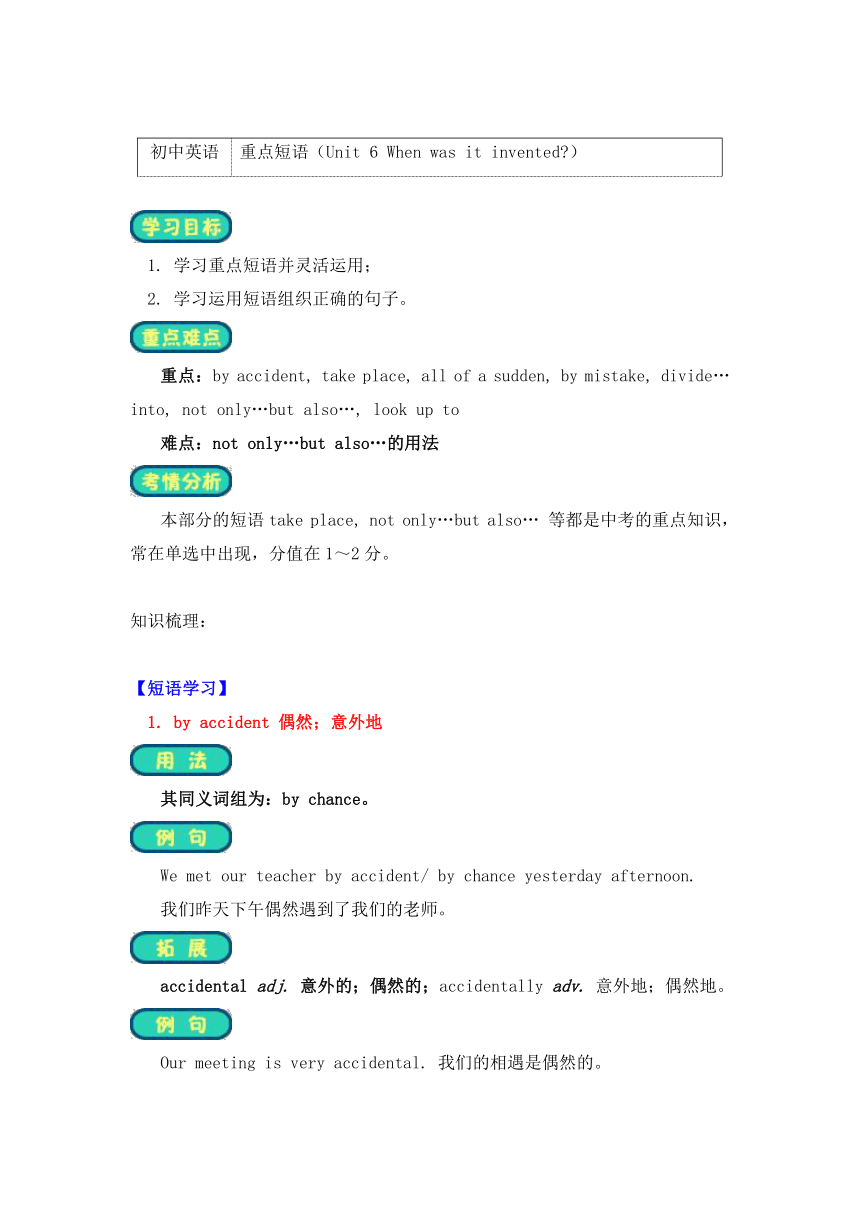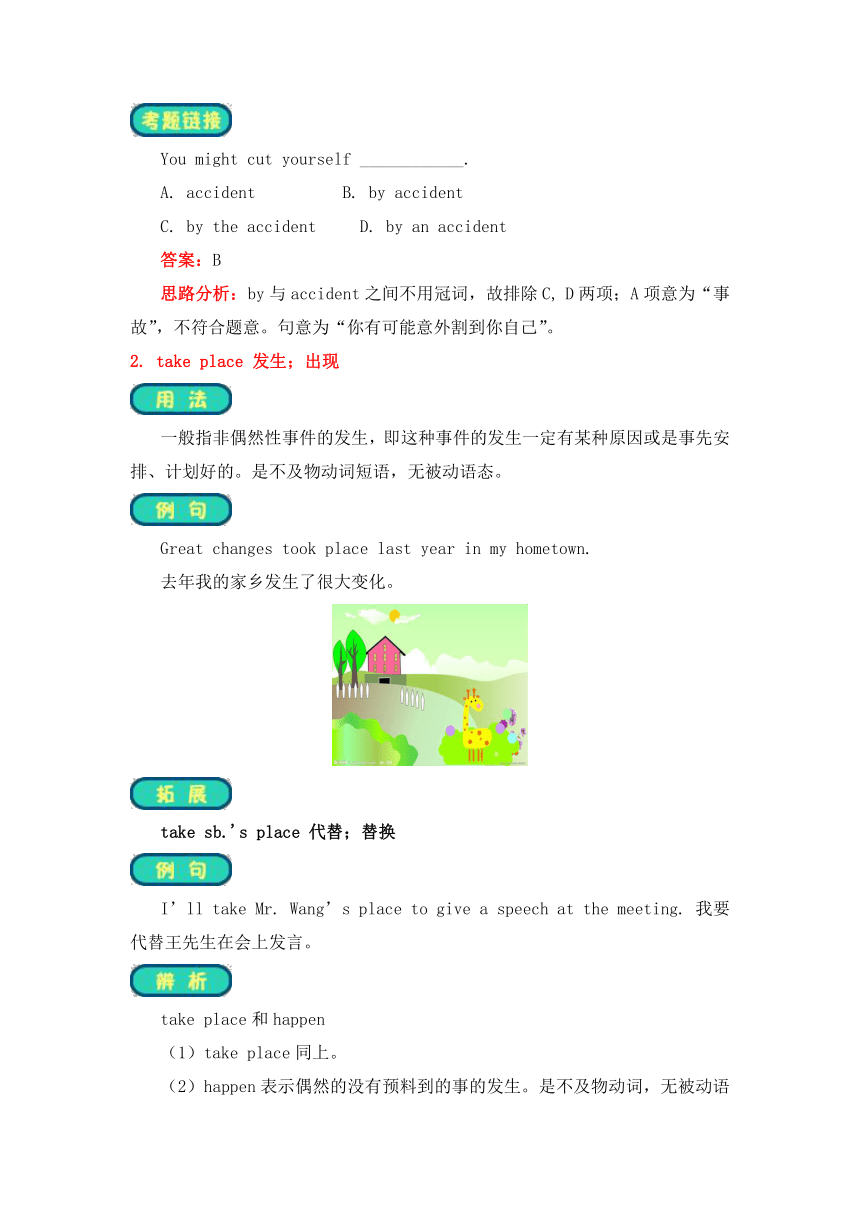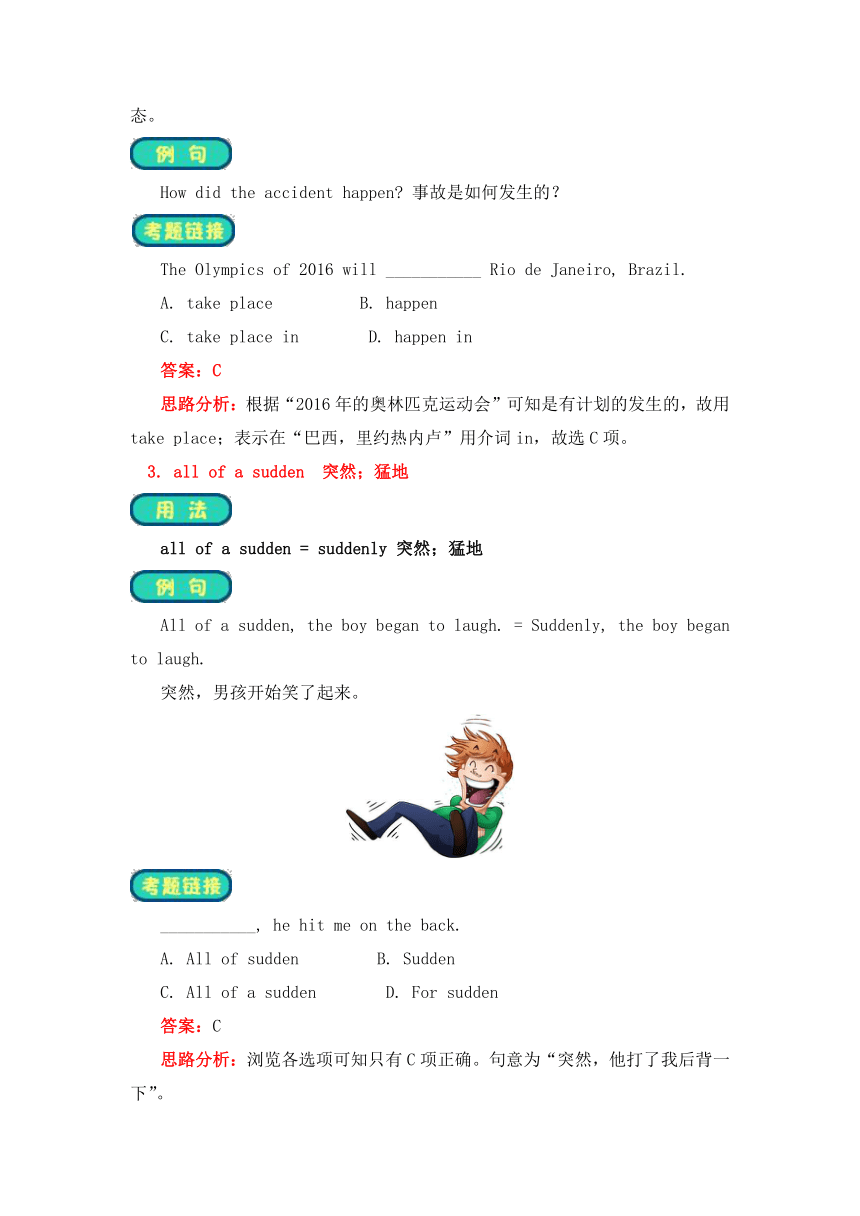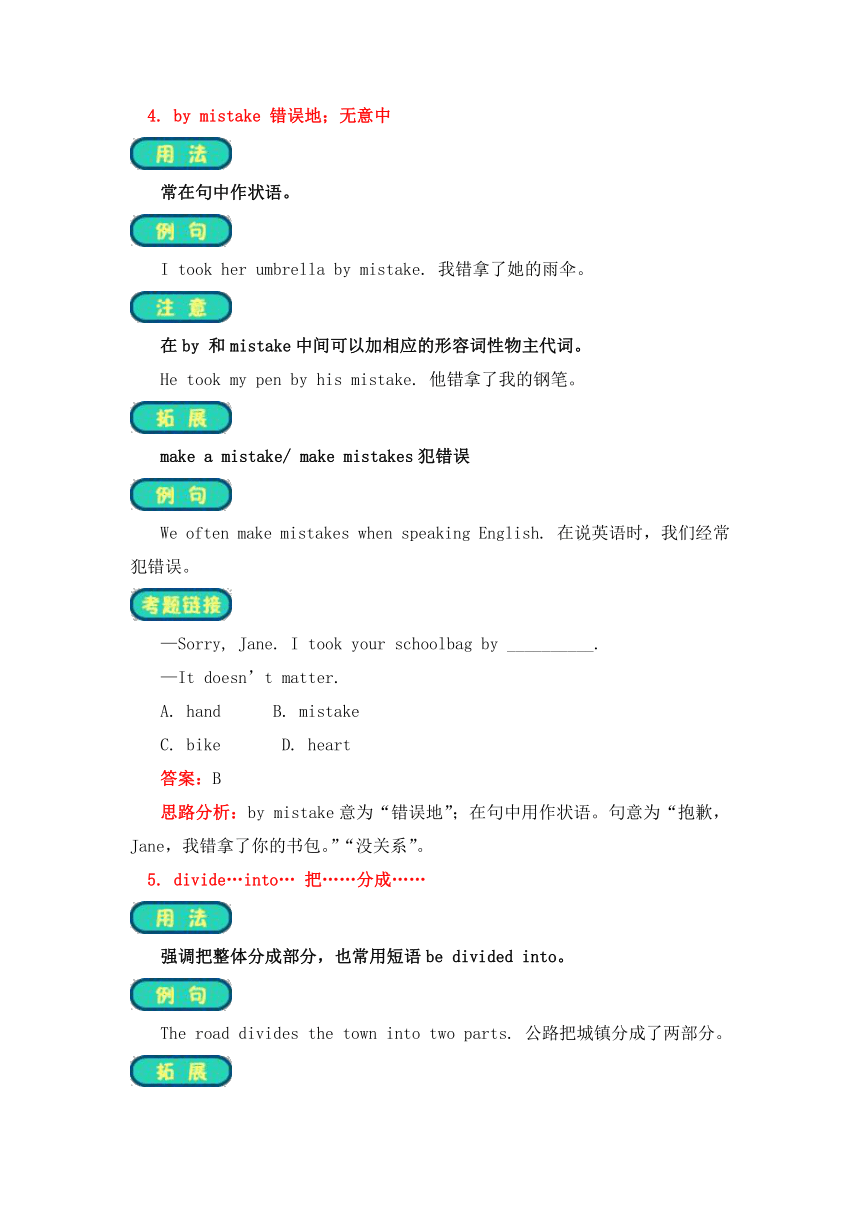人教新目标版英语九年级全Unit 6 When was it invented?重点短语导学案及练习(含答案及解析)
文档属性
| 名称 | 人教新目标版英语九年级全Unit 6 When was it invented?重点短语导学案及练习(含答案及解析) |

|
|
| 格式 | doc | ||
| 文件大小 | 371.5KB | ||
| 资源类型 | 教案 | ||
| 版本资源 | 人教新目标(Go for it)版 | ||
| 科目 | 英语 | ||
| 更新时间 | 2020-09-21 21:17:43 | ||
图片预览





文档简介
初中英语 重点短语(Unit 6 When was it invented?)
1. 学习重点短语并灵活运用;
2. 学习运用短语组织正确的句子。
重点:by accident, take place, all of a sudden, by mistake, divide…into, not only…but also…, look up to
难点:not only…but also…的用法
本部分的短语take place, not only…but also… 等都是中考的重点知识,常在单选中出现,分值在1~2分。
知识梳理:
【短语学习】
1. by accident 偶然;意外地
其同义词组为:by chance。
We met our teacher by accident/ by chance yesterday afternoon.
我们昨天下午偶然遇到了我们的老师。
accidental adj. 意外的;偶然的;accidentally adv. 意外地;偶然地。
Our meeting is very accidental. 我们的相遇是偶然的。
You might cut yourself ____________.
A. accident B. by accident
C. by the accident D. by an accident
答案:B
思路分析:by与accident之间不用冠词,故排除C, D两项;A项意为“事故”,不符合题意。句意为“你有可能意外割到你自己”。
2. take place 发生;出现
一般指非偶然性事件的发生,即这种事件的发生一定有某种原因或是事先安排、计划好的。是不及物动词短语,无被动语态。
Great changes took place last year in my hometown.
去年我的家乡发生了很大变化。
take sb.'s place 代替;替换
I’ll take Mr. Wang’s place to give a speech at the meeting. 我要代替王先生在会上发言。
take place和happen
(1)take place同上。
(2)happen表示偶然的没有预料到的事的发生。是不及物动词,无被动语态。
How did the accident happen? 事故是如何发生的?
The Olympics of 2016 will ___________ Rio de Janeiro, Brazil.
A. take place B. happen
C. take place in D. happen in
答案:C
思路分析:根据“2016年的奥林匹克运动会”可知是有计划的发生的,故用take place;表示在“巴西,里约热内卢”用介词in,故选C项。
3. all of a sudden 突然;猛地
all of a sudden = suddenly 突然;猛地
All of a sudden, the boy began to laugh. = Suddenly, the boy began to laugh.
突然,男孩开始笑了起来。
___________, he hit me on the back.
A. All of sudden B. Sudden
C. All of a sudden D. For sudden
答案:C
思路分析:浏览各选项可知只有C项正确。句意为“突然,他打了我后背一下”。
4. by mistake 错误地;无意中
常在句中作状语。
I took her umbrella by mistake. 我错拿了她的雨伞。
在by 和mistake中间可以加相应的形容词性物主代词。
He took my pen by his mistake. 他错拿了我的钢笔。
make a mistake/ make mistakes犯错误
We often make mistakes when speaking English. 在说英语时,我们经常犯错误。
—Sorry, Jane. I took your schoolbag by __________.
—It doesn’t matter.
A. hand B. mistake
C. bike D. heart
答案:B
思路分析:by mistake意为“错误地”;在句中用作状语。句意为“抱歉,Jane,我错拿了你的书包。”“没关系”。
5. divide…into… 把……分成……
强调把整体分成部分,也常用短语be divided into。
The road divides the town into two parts. 公路把城镇分成了两部分。
divide…from… 把……与……分开
The English Channel divides England from France. 英吉利海峡把英国和法国分开了。
Let’s divide the children __________several parts.
A. in B. into C. from D. at
答案:B
思路分析:根据句意“让我们把孩子们分成几部分吧”可知用divide… into…。而divide…from…意为“把……与……分开”。
6. not only … but also… 不但……而且……
用于连接两个表示并列关系的成分,着重强调后者,其意为“不仅……而且……”;其中的also有时可以省略。
She not only plays well, but also writes music. 她不仅很会演奏,而且还会作曲。
He not only writes his own plays, but also acts in them.
他不仅自编剧本, 还饰演其中的角色。
若连接两个成分作主语,其谓语通常与靠近的主语保持一致,即就近一致原则。
not only… but also…连接两个句子时,置于句首时,not only后面的句子要用倒装句。
Not only you but also he has to leave. 不只是你,他也得离开。
Not only did he speak more correctly, but he spoke more easily.
他不仅说得更正确,而且讲得更不费劲了。
not only… but also…, neither…nor…, either…or…, both …and…
(1)not only…but also…用法同上。
(2)neither…nor…用于连接两个表示并列关系的名词,表示否定两者,其意为“既不……也不……”。若连接两个成分作主语,其谓语通常与靠近的主语保持一致。
It’s neither too cold nor too hot. 天气既不太冷,也不太热。
Neither boys nor girls are interested in it. 男孩子和女孩子,对此都不感兴趣。
(3)either…or用于连接两个表示选择关系的名词或代词,意为“要么……要么……”。若连接两个成分作主语,其谓语通常与靠近的主语保持一致。
Either you or I am wrong. 不是你错了,就是我错了。
(4)both…and…用于连接两个表示并列关系的名词或代词。若连接两个成分作主语,谓语总是用复数。
Both she and I are good at English. 她和我都擅长英语。
Both New York and London have traffic problems. 纽约和伦敦都存在交通问题。
__________ she _________ I know his telephone number, because it has been changed.
A. Both; and B. Either; or C. Not only; but also D. Neither; nor
答案:D
思路分析:根据后半句句意“因为它(电话号码)已经换了”可知“她和我都不知道”,故选D项。A项意为“两者都”;B项意为“要么……要么”;C项意为“不但……而且……”;D项意为“既不……也不……”。
7. look up to 钦佩;仰慕
相当于admire。
I really look up to her because she is so talented. 我真的很钦佩她,因为她很有才华。
look up 查阅(词典、字典等);向上看
Please look up the new words in the dictionary.请在词典中查阅一下这些新单词。
He looked up and saw a big bird flying in the sky.他抬起头看到一只大鸟在空中飞。
The old man _____________ by the world.
A. looks up to B. looked up to
C. was looked up to D. was looked up
答案:C
思路分析:根据by the world“被世人”可知主语是动作的承受者,故用被动语态;look up to意为“钦佩;仰慕”;look up意为“查阅;向上看”;根据句意“那位老人被世人所钦佩”可知选C项。
1. The accident ____________ a rainy night last June.
A. happened on B. happened in C. took place on D. took place in
2. ________my sister _________my brother is a doctor. But they work in different hospitals.
A. Either; or B. Neither; nor C. Not only; but also D. Both; and
3. Children should admire their parents. (改为同义句)
Children should _________ _________ _________ their parents.
4. The potato chips were invented __________ __________(偶然).
5. The class ________ _________ __________(把……分成)three groups.
6. He broke the cup _________ __________(无意中).
7. _________ _________ _________ _________(突然), the storm came and people ran home.
答案:1~2 AC 3. look up to 4. by accident 5. was divided into 6. by mistake
7. All of a sudden
思路分析:1. 主语the accident意为“事故”,事故发生是偶然的、没有预料到的,故用happen的相应形式;表示特指的某一时间用介词on。
2. 根据“但是他们在不同的医院里上班”,可知“不但我姐姐,而且我哥哥也是医生”,故选C项;D项连接并列主语时,谓语动词用复数形式。
(答题时间:20分钟)
Ⅰ. 将下列短语译成汉语
1. 为了娱乐和锻炼 ____________ 2. 创造一个游戏 ___________
3. 阻止……做…… ____________ 4. 钦佩;仰慕 ____________
5. 变得有名 ____________ 6. 不但……而且…… ___________
Ⅱ. 根据汉语意思完成下列句子,每空一词
1. 小女孩直到妈妈回家才停止哭泣。
The little girl __________ stop crying __________ her mom came back home.
2. 我偶然在汽车站遇到了我的一位朋友。
I met one of my friends __________ ___________ at the bus station.
3. 下周我们学校要举行运动会。
A sports meeting will __________ __________ in our school next week.
4. 毫无疑问,钓鱼岛是中国的领土。
___________ ___________, Diaoyu Island belongs to China.
5. 突然,同学们大声喊起来。
__________ __________ __________ ___________, students shouted loudly.
Ⅲ. 阅读理解
In your school bags, you may have a pencil, some kinds of pens, a ruler, and some books. None of these things grow in the fields. They were all made in factories. And, of course, they were invented by some people. There have not always been pencils or pens, a ruler and books. Thousands of years ago no one knew about these things.
Who invented them first? How did they have such clever ideas? We always don’t know. There have been many thousands of inventions, large and small, in the human history. Some of these inventions have changed the world. Such as paper, printing, radio, telephone and computer, and we know the inventors. But we have forgotten most of the other inventors.
Who invented the clock, for example, or the lock to the door? We don’t know. There have been thousands of inventors and we should be grateful to them for their clever ideas. Will you be one of them when you grow up?
1. Most things in your school bags are made of _________.
A. paper B. wood C. metal D. nylon
2. The inventors invented these things because _________.
A. their children were at school B. they hoped to save some money
C. they have a lot of clever ideas D. they have good machines
3. The history books tell us _________.
A. who invented paper and printing B. who invented clocks and doors
C. when the first key was invented D. how much the silk cost
4. We don’t know ________.
A. the names of the inventors of paper B. the names of the inventors of telephone
C. the names of the inventors of lamp D. the names of most inventors
5. The writer wonders _________.
A. if you are an inventor B. if you want to be an inventor
C. what’s invented by you D. how many inventors you know
Ⅰ. 1. for fun and exercise 2. create a game 3. stop/ keep …from doing sth.
4. look up to 5. become famous 6. not only…but also…
Ⅱ. 1. didn’t; until 2. by accident 3. take place 4.Without doubt 5. All of a sudden
Ⅲ. 1. B 解析:根据你书包里的东西铅笔,钢笔,直尺和书籍可知“大多数是由木头制成的”。
2. C 解析:根据句子How did they have such clever ideas?可知C项符合。
3. A 解析:根据句子Such as paper, printing, radio, telephone and computer, and we know the inventors.可知A项正确。
4. D 解析:由句子But we have forgotten most of the other inventors. (我们已忘记了大多数其他的发明家。)可知D项正确。
5. B 解析:根据短文的最后一句Will you be one of them when you grow up? 可知B项是正确答案。
1. 学习重点短语并灵活运用;
2. 学习运用短语组织正确的句子。
重点:by accident, take place, all of a sudden, by mistake, divide…into, not only…but also…, look up to
难点:not only…but also…的用法
本部分的短语take place, not only…but also… 等都是中考的重点知识,常在单选中出现,分值在1~2分。
知识梳理:
【短语学习】
1. by accident 偶然;意外地
其同义词组为:by chance。
We met our teacher by accident/ by chance yesterday afternoon.
我们昨天下午偶然遇到了我们的老师。
accidental adj. 意外的;偶然的;accidentally adv. 意外地;偶然地。
Our meeting is very accidental. 我们的相遇是偶然的。
You might cut yourself ____________.
A. accident B. by accident
C. by the accident D. by an accident
答案:B
思路分析:by与accident之间不用冠词,故排除C, D两项;A项意为“事故”,不符合题意。句意为“你有可能意外割到你自己”。
2. take place 发生;出现
一般指非偶然性事件的发生,即这种事件的发生一定有某种原因或是事先安排、计划好的。是不及物动词短语,无被动语态。
Great changes took place last year in my hometown.
去年我的家乡发生了很大变化。
take sb.'s place 代替;替换
I’ll take Mr. Wang’s place to give a speech at the meeting. 我要代替王先生在会上发言。
take place和happen
(1)take place同上。
(2)happen表示偶然的没有预料到的事的发生。是不及物动词,无被动语态。
How did the accident happen? 事故是如何发生的?
The Olympics of 2016 will ___________ Rio de Janeiro, Brazil.
A. take place B. happen
C. take place in D. happen in
答案:C
思路分析:根据“2016年的奥林匹克运动会”可知是有计划的发生的,故用take place;表示在“巴西,里约热内卢”用介词in,故选C项。
3. all of a sudden 突然;猛地
all of a sudden = suddenly 突然;猛地
All of a sudden, the boy began to laugh. = Suddenly, the boy began to laugh.
突然,男孩开始笑了起来。
___________, he hit me on the back.
A. All of sudden B. Sudden
C. All of a sudden D. For sudden
答案:C
思路分析:浏览各选项可知只有C项正确。句意为“突然,他打了我后背一下”。
4. by mistake 错误地;无意中
常在句中作状语。
I took her umbrella by mistake. 我错拿了她的雨伞。
在by 和mistake中间可以加相应的形容词性物主代词。
He took my pen by his mistake. 他错拿了我的钢笔。
make a mistake/ make mistakes犯错误
We often make mistakes when speaking English. 在说英语时,我们经常犯错误。
—Sorry, Jane. I took your schoolbag by __________.
—It doesn’t matter.
A. hand B. mistake
C. bike D. heart
答案:B
思路分析:by mistake意为“错误地”;在句中用作状语。句意为“抱歉,Jane,我错拿了你的书包。”“没关系”。
5. divide…into… 把……分成……
强调把整体分成部分,也常用短语be divided into。
The road divides the town into two parts. 公路把城镇分成了两部分。
divide…from… 把……与……分开
The English Channel divides England from France. 英吉利海峡把英国和法国分开了。
Let’s divide the children __________several parts.
A. in B. into C. from D. at
答案:B
思路分析:根据句意“让我们把孩子们分成几部分吧”可知用divide… into…。而divide…from…意为“把……与……分开”。
6. not only … but also… 不但……而且……
用于连接两个表示并列关系的成分,着重强调后者,其意为“不仅……而且……”;其中的also有时可以省略。
She not only plays well, but also writes music. 她不仅很会演奏,而且还会作曲。
He not only writes his own plays, but also acts in them.
他不仅自编剧本, 还饰演其中的角色。
若连接两个成分作主语,其谓语通常与靠近的主语保持一致,即就近一致原则。
not only… but also…连接两个句子时,置于句首时,not only后面的句子要用倒装句。
Not only you but also he has to leave. 不只是你,他也得离开。
Not only did he speak more correctly, but he spoke more easily.
他不仅说得更正确,而且讲得更不费劲了。
not only… but also…, neither…nor…, either…or…, both …and…
(1)not only…but also…用法同上。
(2)neither…nor…用于连接两个表示并列关系的名词,表示否定两者,其意为“既不……也不……”。若连接两个成分作主语,其谓语通常与靠近的主语保持一致。
It’s neither too cold nor too hot. 天气既不太冷,也不太热。
Neither boys nor girls are interested in it. 男孩子和女孩子,对此都不感兴趣。
(3)either…or用于连接两个表示选择关系的名词或代词,意为“要么……要么……”。若连接两个成分作主语,其谓语通常与靠近的主语保持一致。
Either you or I am wrong. 不是你错了,就是我错了。
(4)both…and…用于连接两个表示并列关系的名词或代词。若连接两个成分作主语,谓语总是用复数。
Both she and I are good at English. 她和我都擅长英语。
Both New York and London have traffic problems. 纽约和伦敦都存在交通问题。
__________ she _________ I know his telephone number, because it has been changed.
A. Both; and B. Either; or C. Not only; but also D. Neither; nor
答案:D
思路分析:根据后半句句意“因为它(电话号码)已经换了”可知“她和我都不知道”,故选D项。A项意为“两者都”;B项意为“要么……要么”;C项意为“不但……而且……”;D项意为“既不……也不……”。
7. look up to 钦佩;仰慕
相当于admire。
I really look up to her because she is so talented. 我真的很钦佩她,因为她很有才华。
look up 查阅(词典、字典等);向上看
Please look up the new words in the dictionary.请在词典中查阅一下这些新单词。
He looked up and saw a big bird flying in the sky.他抬起头看到一只大鸟在空中飞。
The old man _____________ by the world.
A. looks up to B. looked up to
C. was looked up to D. was looked up
答案:C
思路分析:根据by the world“被世人”可知主语是动作的承受者,故用被动语态;look up to意为“钦佩;仰慕”;look up意为“查阅;向上看”;根据句意“那位老人被世人所钦佩”可知选C项。
1. The accident ____________ a rainy night last June.
A. happened on B. happened in C. took place on D. took place in
2. ________my sister _________my brother is a doctor. But they work in different hospitals.
A. Either; or B. Neither; nor C. Not only; but also D. Both; and
3. Children should admire their parents. (改为同义句)
Children should _________ _________ _________ their parents.
4. The potato chips were invented __________ __________(偶然).
5. The class ________ _________ __________(把……分成)three groups.
6. He broke the cup _________ __________(无意中).
7. _________ _________ _________ _________(突然), the storm came and people ran home.
答案:1~2 AC 3. look up to 4. by accident 5. was divided into 6. by mistake
7. All of a sudden
思路分析:1. 主语the accident意为“事故”,事故发生是偶然的、没有预料到的,故用happen的相应形式;表示特指的某一时间用介词on。
2. 根据“但是他们在不同的医院里上班”,可知“不但我姐姐,而且我哥哥也是医生”,故选C项;D项连接并列主语时,谓语动词用复数形式。
(答题时间:20分钟)
Ⅰ. 将下列短语译成汉语
1. 为了娱乐和锻炼 ____________ 2. 创造一个游戏 ___________
3. 阻止……做…… ____________ 4. 钦佩;仰慕 ____________
5. 变得有名 ____________ 6. 不但……而且…… ___________
Ⅱ. 根据汉语意思完成下列句子,每空一词
1. 小女孩直到妈妈回家才停止哭泣。
The little girl __________ stop crying __________ her mom came back home.
2. 我偶然在汽车站遇到了我的一位朋友。
I met one of my friends __________ ___________ at the bus station.
3. 下周我们学校要举行运动会。
A sports meeting will __________ __________ in our school next week.
4. 毫无疑问,钓鱼岛是中国的领土。
___________ ___________, Diaoyu Island belongs to China.
5. 突然,同学们大声喊起来。
__________ __________ __________ ___________, students shouted loudly.
Ⅲ. 阅读理解
In your school bags, you may have a pencil, some kinds of pens, a ruler, and some books. None of these things grow in the fields. They were all made in factories. And, of course, they were invented by some people. There have not always been pencils or pens, a ruler and books. Thousands of years ago no one knew about these things.
Who invented them first? How did they have such clever ideas? We always don’t know. There have been many thousands of inventions, large and small, in the human history. Some of these inventions have changed the world. Such as paper, printing, radio, telephone and computer, and we know the inventors. But we have forgotten most of the other inventors.
Who invented the clock, for example, or the lock to the door? We don’t know. There have been thousands of inventors and we should be grateful to them for their clever ideas. Will you be one of them when you grow up?
1. Most things in your school bags are made of _________.
A. paper B. wood C. metal D. nylon
2. The inventors invented these things because _________.
A. their children were at school B. they hoped to save some money
C. they have a lot of clever ideas D. they have good machines
3. The history books tell us _________.
A. who invented paper and printing B. who invented clocks and doors
C. when the first key was invented D. how much the silk cost
4. We don’t know ________.
A. the names of the inventors of paper B. the names of the inventors of telephone
C. the names of the inventors of lamp D. the names of most inventors
5. The writer wonders _________.
A. if you are an inventor B. if you want to be an inventor
C. what’s invented by you D. how many inventors you know
Ⅰ. 1. for fun and exercise 2. create a game 3. stop/ keep …from doing sth.
4. look up to 5. become famous 6. not only…but also…
Ⅱ. 1. didn’t; until 2. by accident 3. take place 4.Without doubt 5. All of a sudden
Ⅲ. 1. B 解析:根据你书包里的东西铅笔,钢笔,直尺和书籍可知“大多数是由木头制成的”。
2. C 解析:根据句子How did they have such clever ideas?可知C项符合。
3. A 解析:根据句子Such as paper, printing, radio, telephone and computer, and we know the inventors.可知A项正确。
4. D 解析:由句子But we have forgotten most of the other inventors. (我们已忘记了大多数其他的发明家。)可知D项正确。
5. B 解析:根据短文的最后一句Will you be one of them when you grow up? 可知B项是正确答案。
同课章节目录
- Unit 1 How can we become good learners.
- Section A
- Section B
- Unit 2 I think that mooncakes are delicious!
- Section A
- Section B
- Unit 3 Could you please tell me where the restroom
- Section A
- Section B
- Unit 4 I used to be afraid of the dark.
- Section A
- Section B
- Unit 5 What are the shirts made of?
- Section A
- Section B
- Review of Units 1-5
- Unit 6 When was it invented?
- Section A
- Section B
- Unit 7 Teenagers should be allowed to choose their
- Section A
- Section B
- Unit 8 It must belong to Carla.
- Section A
- Section B
- Unit 9 I like music that I can dance to.
- Section A
- Section B
- Unit 10 You're supposed to shake hands.
- Section A
- Section B
- Review of Units 6-10
- Unit 11 Sad movies make me cry.
- Section A
- Section B
- Unit 12 Life is full of the unexpected
- Section A
- Section B
- Unit 13 We're trying to save the earth!
- Section A
- Section B
- Unit 14 I remember meeting all of you in Grade 7.
- Section A
- Section B
- Review of Units 11-14
